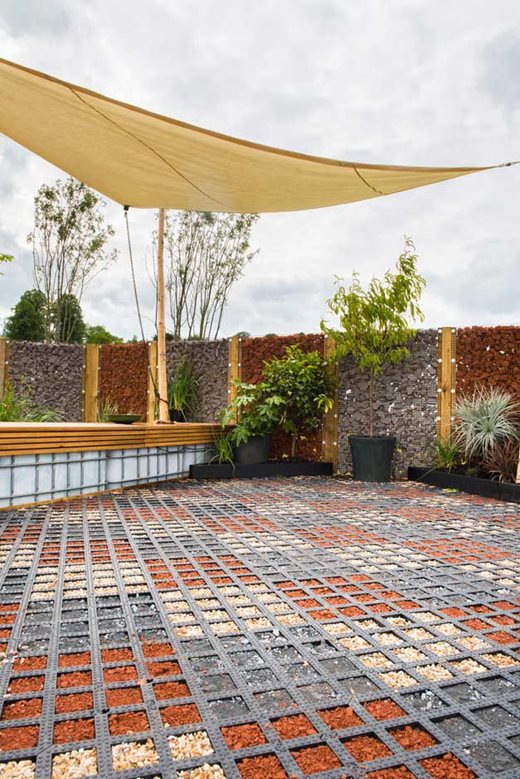From pioneering research into what climate change means for gardeners, to getting a grip on plant naming, RHS scientists had a very busy summer!
As with the rest of the RHS, spring and summer was a busy time for RHS Science with the opportunities presented by the flower shows and the need to get cracking with the seasonal experimental work keeping us off the streets from April onwards. As the UK’s gardeners started enjoying their spring gardens and planning for the season ahead so RHS scientists started planting their experimental plots and gardening advisors got to work helping members with their planning, maintenance and problem solving.
 Flower shows this year have not only provided a touring platform for the gardening advisors who have answered questions, given talks and participated in panel discussions, they have also been a major opportunity for RHS Science to talk to gardeners about the challenges we face in our changing world. The focus in 2017 has been very much on climate change and how gardeners can adapt and thrive given predictions for changing weather.
Flower shows this year have not only provided a touring platform for the gardening advisors who have answered questions, given talks and participated in panel discussions, they have also been a major opportunity for RHS Science to talk to gardeners about the challenges we face in our changing world. The focus in 2017 has been very much on climate change and how gardeners can adapt and thrive given predictions for changing weather.
 Gardening in a changing climate
Gardening in a changing climate
In April 2017 the RHS, in collaboration with Dr Ross Cameron (University of Sheffield) and Dr Alastair Culham (University of Reading), published the Gardening in a Changing Climate report.
Bringing together updated climate change predictions for the regions of the UK, survey data from gardeners and horticultural professionals and an extensive review of the literature around climate change, the report shows a mixed picture with strong regional variations in how conditions will change and what gardeners can do to adapt.
To help bring this research to life for gardeners, report authors Dr Eleanor Webster and Dr Ross Cameron worked with garden designer Andy Clayden to produce a garden for the RHS Chatsworth Flower Show that illustrated a typical garden in northern England today, and how it might look adapted for conditions in the latter half of the 21st century. You can read all about the garden and its success at Chatsworth in Eleanor’s blog.
 Plants for Bugs – second paper revealed
Plants for Bugs – second paper revealed
Following on from our first paper on pollinators, the second paper from our Plants for Bugs research covers the invertebrates living on the plants themselves. Covering four groups; herbivores (plant-eaters), predators (animal-eaters), omnivores (plant and animal-eaters) and detritivores (organic matter-eaters or recyclers) this is another step towards providing comprehensive guidance for gardeners about how to maximise biodiversity in your garden.
You can read the full paper here or read more about the findings and what they mean for gardeners in our blog. A guide for gardeners is also available.
Plant registration – a flurry of publications
In our role as International Cultivar Registration Authority (ICRA) for nine plant groups, we play a vital role in ensuring the stability and reliability of cultivar names. Registration is a key way to ensure that plant names are not duplicated and comply with naming requirements under the ICNCP (International Code of Nomenclature for Cultivated Plants). We have recently published both Sander's List of Orchid Hybrids, 3 Year Addendum, 2014-2016, and the 11th Supplement to the International Rhododendron Register and Checklist. To find out more about cultivar registration please see our website.
 Plant Finder 30 – celebrating a seminal work
Plant Finder 30 – celebrating a seminal work
The RHS Plant Finder celebrated its 30th anniversary this year and the Horticultural Information & Advice team, along with colleagues at RHS Media and Wisley Curatorial felt that a fitting celebration was needed. The book, and now its online companion has provided an important resource for home and professional gardeners over three decades and the display in front of the Laboratory at RHS Garden Wisley celebrated the diversity of plants added to the book over time and what they mean to gardeners across the country.
RHS Science in the news
BBC News coverage of the implications of the Gardening in a Changing Climate report
Telegraph feature by Ken Thompson on the implications of the second Plants for Bugs paper
BBC Radio 4’s Today programme – RHS Entomologist Dr Andrew Salisbury discusses why bugs are an important part of our gardens (50 minutes in)
Local, regional and trade titles went mad for a Spurge Hawk Moth caterpillar not seen for 150 years and then found at RHS Garden Hyde Hall.
Upcoming events
RHS Annual John MacLeod Lecture – Prof. David Wolfe, Cornell University, New York. Professor Wolfe will be giving this year’s lecture and will be taking forward the discussions from last year on climate change and gardening. He will speak on Gardening with a Mission - Providing leadership for climate change adaptation and mitigation. The lecture will be held on 9 November 2017 and will be live streamed on rhs.org.uk/macleodlecture and Facebook.
Wisley Flower Show – RHS Horticultural Advisors will be on hand to help with your gardening conundrums.
Gardening Advice Twitter clinics – we are trying out a weekly advice slot on Twitter where our Horticultural Advisors will be on hand to help with gardening queries in a quick-fire style – Tuesdays from 12 noon to 2pm: tweet @the_rhs to take part.

